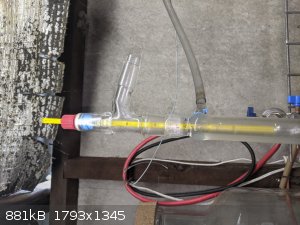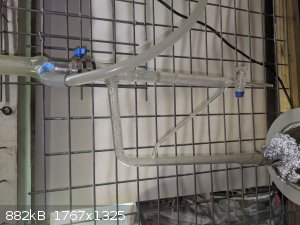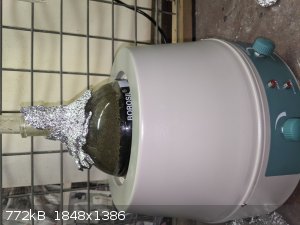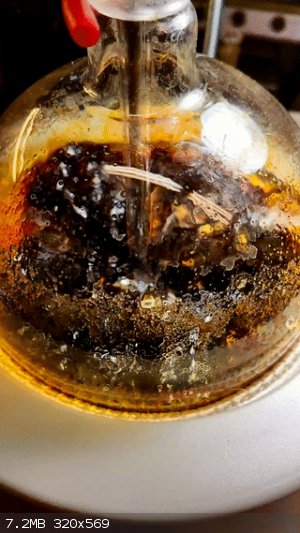caput_mortuum
Harmless

Posts: 13
Registered: 9-1-2019
Member Is Offline
|
|
Condenser heating up during hydrosdistillation
Hi All,
I couldnt find a perfect forum for this question so my apologies if I got that part wrong...
Ok so I was hydrodistilling rosemary to get the essential oil, which I have done quite a few times now, and my condenser got very hot to touch and the
steam was flying out of the top of it rather than cooling down. I swear it was whistling as well. This is the first time that has happened, but it is
also the first time I used my fancy new (ebay sourced) heating mantle
setup:
(pictures attached)
band new heating mantle (crappy chinese one from ebay i got for $100ish)
1000ml flat bottom flask with the herb/water in it
clevenger apparatus connected to that
Liebig condenser connected to the clevenger
Y adapter connected to the liebig
Thermometer on top of that
I've done quite a few extractions like this but with my old, op shop scored portable stove top and i've never had this happen
Throughout the extraction I noticed the clevenger was getting hot and the heat was moving upwards through the glass. Usually the arm gets a bit hot
but by the joint with the condenser its just mild and the condenser never got hot
I had the mantle set at 12 o'clock (1/2 way, goes from 9 o'clock to 3 o'clock). setting to 10 wasnt enough - couldnt produce steam, 11 seemed too
gentle. Perhaps 12 was too much?
Is the mantle just set too high? or have i setup the mantle incorrectly? perhaps the water in the condenser wasnt cold enough?
thanks for any advice
  
|
|
|
zed
International Hazard
    
Posts: 2284
Registered: 6-9-2008
Location: Great State of Jefferson, City of Portland
Member Is Offline
Mood: Semi-repentant Sith Lord
|
|
Well, you may have forgotten to turn your condenser water on.
However, if you have been using a hot plate in the past, and you have just switched to a heating mantle; now you know. Heating mantles put out a lot
of heat.
I have had many attempted distillations fail, due to insufficient heat.
Never had a distillation fail, when I used a heating mantle.
Now, tell us more about this hot, hot, hot, heating mantle.
How much was it? Where can I get one? How long did it take to arrive?
[Edited on 3-2-2021 by zed]
|
|
|
Fulmen
International Hazard
    
Posts: 1726
Registered: 24-9-2005
Member Is Offline
Mood: Bored
|
|
Simply put: You have put more energy in than the condenser could remove. So either increase water flow or reduce the heating.
We're not banging rocks together here. We know how to put a man back together.
|
|
|
Sulaiman
International Hazard
    
Posts: 3734
Registered: 8-2-2015
Location: 3rd rock from the sun
Member Is Offline
|
|
+1 on the extra heat.
Heating mantles loose much less heat to the environment than hotplates,
I'd estimate 2 to 3 times more efficient,
e.g. a 500W heating mantle can heat an rbf equivalently to a 1 to 1.5 kW hotplate.
The simplest solution is to reduce the heating power,
or you could add another condenser to your existing one.
I can recommend this type for its efficiency at reasonable cost
https://www.ebay.co.uk/itm/24-29-Jionts-Glass-Reflux-Graham-...
CAUTION : Hobby Chemist, not Professional or even Amateur
|
|
|
caput_mortuum
Harmless

Posts: 13
Registered: 9-1-2019
Member Is Offline
|
|
Quote: Originally posted by zed  | Well, you may have forgotten to turn your condenser water on.
However, if you have been using a hot plate in the past, and you have just switched to a heating mantle; now you know. Heating mantles put out a lot
of heat.
I have had many attempted distillations fail, due to insufficient heat.
Never had a distillation fail, when I used a heating mantle.
Now, tell us more about this hot, hot, hot, heating mantle.
How much was it? Where can I get one? How long did it take to arrive?
[Edited on 3-2-2021 by zed] |
got it on ebay - but i got it for $120. took about 5 days to arrive
|
|
|
caput_mortuum
Harmless

Posts: 13
Registered: 9-1-2019
Member Is Offline
|
|
Quote: Originally posted by Sulaiman  | +1 on the extra heat.
Heating mantles loose much less heat to the environment than hotplates,
I'd estimate 2 to 3 times more efficient,
e.g. a 500W heating mantle can heat an rbf equivalently to a 1 to 1.5 kW hotplate.
The simplest solution is to reduce the heating power,
or you could add another condenser to your existing one.
I can recommend this type for its efficiency at reasonable cost
https://www.ebay.co.uk/itm/24-29-Jionts-Glass-Reflux-Graham-... |
ok, i was wondering if the mantle might of been putting out ambient heat... or the mantle might of been dodgy and shouldnt be used. Sounds like i need
somewhere between 11 and 12 on the mantle, it must be more sensitive than i thought.
re condensers, i was looking at getting an Allihn, I was under the impression that Graham is rarely used?
|
|
|
Fyndium
International Hazard
    
Posts: 1192
Registered: 12-7-2020
Location: Not in USA
Member Is Offline
|
|
Coil condensers are my favorite. Simple and most effective and cheap and work well for distillation and reflux and can even be used as fractionating
column. Liebig has rather small surface area and is easily overrun. Graham is mostly only well suitable for cooling already-condensed vapors, as
placed after an actual condenser and can be used in vertical setting, never as reflux unless perhaps the inner coil diameter is large like 10-20mm ID
and yet it can easily be choked. I have used this as secondary phase for cooling for example ether, and for vacuums when I want to cool the condensate
as much as possible to minimize reach of any fluids to cold trap/pump.
|
|
|
Sulaiman
International Hazard
    
Posts: 3734
Registered: 8-2-2015
Location: 3rd rock from the sun
Member Is Offline
|
|
The condenser that I pointed to is wrongly described as a Graham, it is actually more like a Dimroth.
CAUTION : Hobby Chemist, not Professional or even Amateur
|
|
|
zed
International Hazard
    
Posts: 2284
Registered: 6-9-2008
Location: Great State of Jefferson, City of Portland
Member Is Offline
Mood: Semi-repentant Sith Lord
|
|
The Graham is very efficient, but the Graham is touchy for reflux. The down-flowing condensate tends to block-off the condenser, causing pressure
build-up. This pressure can blow liquid out the top of your condenser.
Very bad, if you re working with Ether. Might burn down your house, and turn you, into a crispy-critter.
Nice for distilling, or as a scavenger condenser (on top of another condenser).
The Dimroth is great but fragile. The Fredrichs is great but expensive. Very expensive.
[Edited on 4-2-2021 by zed]
|
|
|
monolithic
Hazard to Others
  
Posts: 436
Registered: 5-3-2018
Member Is Offline
Mood: No Mood
|
|
I had the same issue when trying steam distillation. To add on to what others have been saying, maybe look into a Davies condenser. They are also
"more efficient," much like the Dimroth or Friedrichs. If you want to do it cheap and have the scaffolding to clamp everything down, you could also
just stack Liebig condensers until you get enough cooling capacity. Just be aware of the mechanical losses (probably would be ideal to wash the bore
of your condensers directly into the receiving flask, when you're finished with the distillation.)
|
|
|
zed
International Hazard
    
Posts: 2284
Registered: 6-9-2008
Location: Great State of Jefferson, City of Portland
Member Is Offline
Mood: Semi-repentant Sith Lord
|
|
Yup. I've got multiple short condensers now. They were dirt cheap from China a few years ago. I can stack them, or mix and match them. I'd like to
have a Friedrichs though. A single Friedrichs, costs as much as a whole Chemistry kit. Expensive used. Expensive even from China.
|
|
|
zed
International Hazard
    
Posts: 2284
Registered: 6-9-2008
Location: Great State of Jefferson, City of Portland
Member Is Offline
Mood: Semi-repentant Sith Lord
|
|
Yup. I've got multiple short condensers now. They were dirt cheap from China a few years ago. I can stack them, or mix and match them. I'd like to
have a Friedrichs though. A single Friedrichs, costs as much as a whole Chemistry kit. Expensive used. Expensive even from China.
|
|
|
caput_mortuum
Harmless

Posts: 13
Registered: 9-1-2019
Member Is Offline
|
|
in case someone else searches the forum with a similar problem and finds this topic, last weekend I tried another hydrodistillation of rosemary and
had much better results. Based on feedback (Fulmen was bang on with both suggestions) here and some more reading through the week, I changed:
Ice water actually going through the system. Turns out that the water was "stuck" - not flowing though the condenser at all. I dont have a
strong pump so I rely on gravity and suction to start the flow but the extra height of the heating mantle must of made my usual method of setup
invalid and I missed this detail originally
Lower Temp. Had to ride the temp control and found with this particular mantle getting the liquid almost boiling at 12 o'clock and setting it
back down to 11 - 11:30 kept it at the temp I needed. at 12o'clock the flask was in danger of shooting its contents up the clevenger and beyond
only a slight smell of rosemary escaped the liebig, no steam. success!
I think the flow of the water was a big contributor, i've always managed to get it flowing before so i must admit i was a bit lax there
I'm looking into more appropriate condensers for vertical use (i knew Liebig wasnt the best but it was all i had. Now i have an excuse to buy another
 ) and figure i'll just get a collection going and try them out based on what I
read and recommendations here. Thanks for the responses!!! ) and figure i'll just get a collection going and try them out based on what I
read and recommendations here. Thanks for the responses!!!
|
|
|
pneumatician
Hazard to Others
  
Posts: 412
Registered: 27-5-2013
Location: Magonia
Member Is Offline
Mood: ■■■■■■■■■■ INRI ■■■■■■■■■■ ** Igne Natura Renovatur Integra **
|
|
use a ROUND botoom flask. if you use a small container with cold water touch the container after some time of work to see if is hot. Use ALWAYS the
lower temp necessary for your work, a lot of idiots put the mantle... at full temp :-)
Another is to use the right condenser and if not work, use a like this to separate condenser from the heat source
https://www.ebay.com/itm/Distillation-adapter-Distilling-ada...
or one like this:
https://www.ebay.com/itm/Proglass-Adapters-Inlet-Inner-Joint...
or one of this:
https://www.ebay.com/itm/CHEMGLASS-Glass-1000mL-Chromatograp...
|
|
|
SWIM
National Hazard
   
Posts: 970
Registered: 3-9-2017
Member Is Offline
|
|
Not that it's important for steam distillation as the temperature at the still head usually isn't monitored, but the thermometer in that picture is
way too far down.
Maybe the restriction it caused was responsible for the whistling sound.
You really ought to get a good water pump. they're pretty cheap in sizes appropriate for condensers.
I haven't bought a new one in many years and don't remember the capacity in Liters per hour needed, but as a general rule it shouldn't need to be
abler to fill a container as fast as you could if you'd had a few beers and have a good prostate.
I think 60 liters per hour would be more than enough with your glassware, which looks like 14/20 to me.
Maybe even 1/2 of that.
|
|
|
Aloesci
Harmless

Posts: 28
Registered: 7-4-2018
Member Is Offline
Mood: No Mood
|
|
Im not going to mention cooling and pumping your water because everyone else has, but i have this to say about the mantle:
I have the exact same heating mantle and it gets very hot so easily.
Even when the heating is turned all the way to zero, it heats up.
Normally i simply plug it in with the heating dial turned down to off, and then let it heat the flask for about 10 minutes. If it needs more heating,
only then will I turn up the dial.
Its not ideal but its a fairly cheap heating mantle and it can boil literally anything i have access to.
|
|
|
Fyndium
International Hazard
    
Posts: 1192
Registered: 12-7-2020
Location: Not in USA
Member Is Offline
|
|
You mean your condenser does not condense everything, or you don't cool it enough?
Because water has such high thermal capacity it can turn 10 liters of ice water into too hot to touch water in no time when doing distillations. When
I ran several liters of ethanol through my still, I had to change the reservoir water many times.
Meanwhile, I can assure you that anything you can produce with amateur size glassware, an ordinary condenser, without causing other issues like
superheating, even as short as 200mm can condense eveything if the bp is in the range of water.
Small aquarium pumps cost less than 20$ and they can pump from 200 liters up to 1000 liters per hour. This is far from truth because the resistance
caused by your tubing, condenser inlets and others will choke it, but it still is very enough to cool your stuff. If you can wait, you can get decent
usb water pumps from eBay for as low as 2$ and they are quite good for water circulating. Their head is only 0.5m or something, so you have to fill
the system at or below the pump level before assembling the still, but after that it works because the hydrostatic pressure balances it out, presuming
your water outlet runs to same reservoir than the inlet.
|
|
|
pneumatician
Hazard to Others
  
Posts: 412
Registered: 27-5-2013
Location: Magonia
Member Is Offline
Mood: ■■■■■■■■■■ INRI ■■■■■■■■■■ ** Igne Natura Renovatur Integra **
|
|
I purchased a little acuarium pump and is not enought strong to push the water up the 60cm condenser, so I need to buy another more strong or more
l/h.
these pumps connected directly to 220V are very dangeurous, no? well if water enter in contact with electricity I hope the electric system break and
all current go off??? or if I touch some element electric current "friendly" I get a good discharge? :-)
|
|
|
Fyndium
International Hazard
    
Posts: 1192
Registered: 12-7-2020
Location: Not in USA
Member Is Offline
|
|
Unless you live in a very rural setting the electric system has RCD which kills the circuit if there is grounding, also the fuse switch blows open if
you short circuit it. All my pumps are mains powered and immersible and I haven't never stressed that part, they are cast solid so they don't leak
unless you really break them.
You will have to buy a pretty large pump to push the water column. My smallest pump can only give about 30-40cm of head until it stalls. I explained
it in my last phrase of my last message: you will have to balance the hydrostatic pressure in the system so any pump will circulate the water well
because the pressure differential is zero. The water coming down back to reservoir forms siphon like effect that will balance the pressure. In order
to prime the system, lower the column to at or below the reservoir water level in order to fill it before assembling the still and tilt it if
necessary to let any air bubbles out. I always put the tubes on at the table and leave the column there and start the water pump, so it fills the
circuit with water and pushes any air out before I put the pieces together. Unless you have elevation differential of several meters up to 10 meters,
any pump that merely moves the water works well. Don't use high pressure pumps because you will pop the tubes off or worst case crack the glassware
and it is absolutely unnecessary to pump that much water - it will only heat up the reservoir quicker.
Having a drop or two of dishwashing detergent in the coolant water limits bubble formation, enhancing cooling efficiency a lot. Liebig has such small
surface area that if it's partially covered in bubbles, it may not condense stuff properly. Adding too much will cause foaming issues though so take
the drop literally.
|
|
|
pneumatician
Hazard to Others
  
Posts: 412
Registered: 27-5-2013
Location: Magonia
Member Is Offline
Mood: ■■■■■■■■■■ INRI ■■■■■■■■■■ ** Igne Natura Renovatur Integra **
|
|
well, now I don't remenber if I make a try lowering the outt condenser mouth... but anyway I use a 350 liters and the water out go to the bottom of
the barrell otherwise the heated water remain in the superior part and a 2 layers of water form, one cold and another hot. Not so easy my friend,
after distil 5l of water x 6 times the 350liters of cooland water are at around 50 ºC not enought cold to be usable more until cold down again after
some days in WINTER :-) in SUMMER more days of cooling and minus distil uses because the water go hot pretty quick.
So many people use a ridicoulus 5 liters of water to cold down the distillate but... waht the hell are distilling? and more, using short condensers of
30cm??? :-) Holy shit!
|
|
|
Fyndium
International Hazard
    
Posts: 1192
Registered: 12-7-2020
Location: Not in USA
Member Is Offline
|
|
My condenser is actually 20cm. I also got 60cm condenser but rarely need to use it. I just distilled 5L of ethanol with the short one with no issue.
And yes, you'll need to change or cool the coolant pretty often. During winter, it's easy to just use outdoors to cool it or add snow to the
reservoir. If I'd had no snow, I'd get the cheapest garden hose tubing and spread it all around the yard and circulate the water through it.
|
|
|
pneumatician
Hazard to Others
  
Posts: 412
Registered: 27-5-2013
Location: Magonia
Member Is Offline
Mood: ■■■■■■■■■■ INRI ■■■■■■■■■■ ** Igne Natura Renovatur Integra **
|
|
20 cm for etanol? well the atmosphere of your lab is not full of etanol smell? with water in the lower temp I can put with a 60cm condenser some
vapour is lost. with water and wine sometimes from a smooth distillation pass to a violent fussssssss and some vapour pass out all the 60cm condenser
in vapor and is lost in the air.
But always something is lost because distilling wine or aqua vitae the room is full of smells and the humidity with distilling water go up, inclusive
with no apparent losses by the end outlet of the distillation apparatus.
|
|
|
Fyndium
International Hazard
    
Posts: 1192
Registered: 12-7-2020
Location: Not in USA
Member Is Offline
|
|
I have used cold trap with the still and it has zero condensation after the run, so, no.
I also have 50L bokakob still, but with that I use mains water primarily because I use it so rarely I don't bother setting up reservoirs and pumps.
With stripping run, it can give several liters per hour, but with full azeotropic reflux it takes more than hour to produce a liter.
I don't have fuzzes because I use activated carbon as boiling chips. It will usually work even with vacuum distillations. For example:

|
|
|
pneumatician
Hazard to Others
  
Posts: 412
Registered: 27-5-2013
Location: Magonia
Member Is Offline
Mood: ■■■■■■■■■■ INRI ■■■■■■■■■■ ** Igne Natura Renovatur Integra **
|
|
Quote: Originally posted by Fyndium  | | Unless you live in a very rural setting the electric system has RCD which kills the circuit if there is grounding, also the fuse switch blows open if
you short circuit it. All my pumps are mains powered and immersible and I haven't never stressed that part, they are cast solid so they don't leak
unless you really break them. |
this not explain how people die in the bath playing with phone. charging it??
|
|
|
Fyndium
International Hazard
    
Posts: 1192
Registered: 12-7-2020
Location: Not in USA
Member Is Offline
|
|
The modern RCD will kill the circuit if you attempt to commit hairdryer suicide. This is why stupid people thrive. What you mentioned also makes it a
nasty device, because it can cut power from vital systems at the worst moment. I once got into this when *something* caused it to kill power when I
was in a critical phase in a synthesis with overhead stirring. First of all, lost full control of stirring and cooling, and secondly was in total
darkness. Luckily I had good sense of surroundings and got to the panel within seconds and avoided a catastrophy.
I have accidentally grounded and short circuited systems multiple times, and it just slaps the switch open from the panel and I have to go to reset
it. I don't suggest anyone actually testing it's function unless they know what they're doing - and at least find out if you have one. Simple fuse
will do little when you form a grounding for the electric grid, the throughput of human body is likely less than 16 amperes in 220VAC countries, at
least for the time it takes to fry you.
[Edited on 25-3-2021 by Fyndium]
|
|
|